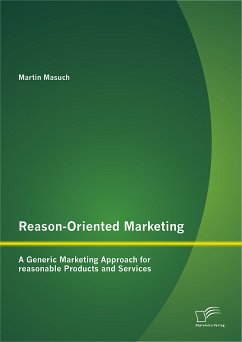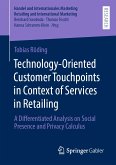The modern economic world is characterized by a vast number of different customer requirements, products, and variations of products, as well as ideas, meanings, opinions, and arguments. Marketing activities are nowadays embedded in a complex world characterized by a multitude of interdependencies and interrelations between different stakeholders and interest groups. Hitherto, economic systems, and above all marketing strategies, strive to separate concerns in order to control the whole. The development of autonomous and stand-alone marketing concepts in the past reflects this paradigm. To cope with the global and networked conditions of the presence, suitable strategies have to be designed which are able to manage the requirements of transitional relationships. The combination of transverse reason and the open society as well as the conceptual transfer to the field of marketing leads to the concept of reason-oriented marketing. The generic character of reason-oriented marketing is enabled by methodical patterns which presents solutions to selected aspects of the marketing process. These patterns constitute generic blueprints for sample solutions that can be systematically arranged to design a strategic implementation of reasonable thinking within the marketing process. The patterns consider particularly the relationships and interactions between the interest groups of the macro environment, by integrating: -the perception and recognition of needs, interests, and requirements of the macro environment. -the association and combination of different rational aspects to form a holistic viewpoint on the totality of arguments and opinions. -the foresight in terms of future impacts and consequences of marketing decisions and instruments. -the principles of criticism and discourse to enable a dialog between the involved stakeholders and interest groups. -the ability to change perspectives systematically within the entirety of rational aspects. -the management of transitions between the core marketing processes and the interest groups of the macro environment. -the justice of decisions and procedures within the marketing process to ensure fairness and appreciation concerning different interests and arguments. -the cooperation and participation between the participants of the marketing process and the interest groups of the surrounding macro environment. The reason-oriented marketing approach enables the involved parties in the field of marketing to contribute their needs and interests to the marketing process and to develop reasonable concepts of products that consider the requirements of the stakeholders as well as the constraints and conditions of the macro environment. In fact, reason-oriented marketing is not designed to replace traditional marketing strategies and concepts, but rather to integrate them into a universal approach to marketing. The concept of reason-oriented marketing widens the perspective of marketing into greater awareness and responsibility for our future.
Dieser Download kann aus rechtlichen Gründen nur mit Rechnungsadresse in A, B, BG, CY, CZ, D, DK, EW, E, FIN, F, GR, HR, H, IRL, I, LT, L, LR, M, NL, PL, P, R, S, SLO, SK ausgeliefert werden.









